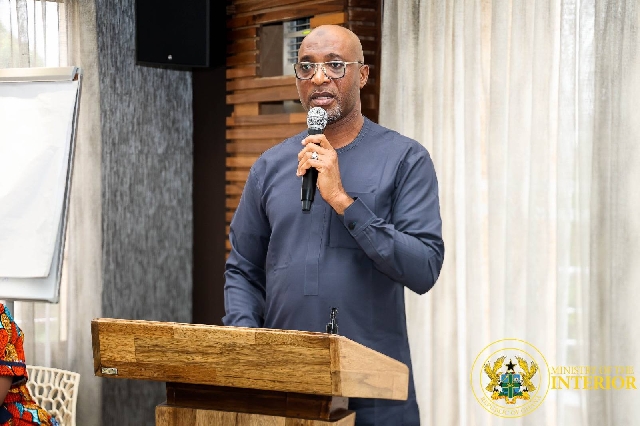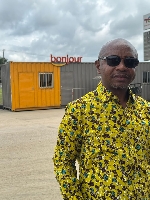The Gbinyiri crisis-a sad reflection on Ghana
 Mohammed Muntaka Mubarak
Mohammed Muntaka Mubarak
When was the last time you heard a Ghanaian being referred to as a refugee in your life? Economic migrant?
That sounds normal. A refugee?
Now that hits very hard.
That was supposed to be a remote conversation. We are having that now, courtesy of the Gbinyiri land conflict in the Savannah Region.
The violence, which broke out on August 24, 2025, has claimed 36 lives and left 18 others injured.
The clashes, sparked by the sale of land by the local chief to a private developer, have spread across about 12 communities in the Sawla-Tuna-Kalba District.
The unrest has forced nearly 48,000 residents to flee their homes.
More than 13,000 have crossed into Côte d’Ivoire, while others are being sheltered in camps managed by the National Disaster Management Organisation (NADMO) and the Ghana Red Cross Society.
Women and children form the majority of those displaced, raising humanitarian concerns.
HISTORY
Land issues in Ghana can be found anywhere from the South to the North.
In the South, many have harrowing stories to tell.
Land sold to them had been sold to God knows how many people.
Those with the financial clout and connections are then able to wiggle their way through, with many losing out.
Others have been chased off their lands by landguards who act with such brutality, leading to the loss of property and lives on some occasions.
The courts have also become battlegrounds for the ownership of these lands, with some cases taking ages to arrive at a conclusion.
The question that naturally arises is why this is even a conversation in the first place.
It is alleged that families and some traditional leaders in connivance with officials at the Lands Commission play a big part in this lawlessness,s which continues till this day.
When there appear to be no clear and applicable rules of land ownership, conflicts would naturally emerge. Up North, these conflicts have been ethnic in nature, thus the surprising element in this particular case.
ARMS
On the 23rd of July, just two weeks before his sad demise, former Defence Minister Dr Omane had revealed that thousands of ammunition had been missing from the armoury of the Ghana Armed Forces.
He went ahead to raise concerns about these ammunition ending up in the wrong hands.
How do we have such a level of impunity in any serious country? It appears that arms acquisition is probably one of the easiest things to do in this country.
If that is not the case, how have these arms become a point of conversation with all of the conflicts in the north? How have so many of the locals been able to acquire them?
Elsewhere, one needs to go through a rigorous process to own a firearm with multiple checks on the individual’s background. It is quite clear that many who have them have not acquired them legally but through multiple illegal means.
POROUS BORDERS
Concerns have been raised about the ease with which all kinds of goods are smuggled through the porous border areas, be it from the east (Togo), North (Burkina Faso and the Sahel Region), West (Cote D’Ivoire) or unapproved sea routes in the Gulf of Guinea. It is almost impossible, given the cost, to build a protective wall around the country.
The security agencies may be doing their bit this is clearly not enough.
Whether it is a lack of equipment or human resources, it is obvious that a lot has to be done to curb the influx of weapons into conflict-prone areas.
What kind of intelligence is being gathered to decisively deal with the influx to stop the smuggling of small arms and other weapons from finding their way here? I respectfully ask.
SECURITY AGENCIES
The argument has been made that one of the reasons why it appears many are quick to resort to the acquisition of arms is because the locals do not trust the various security agencies to be doing enough to protect them; thus, they resort to protecting themselves through procuring these arms.
That argument, in my opinion, can be made with respect to what the law legislates in this country. The laws are clear on the legal acquisition of ownership of guns.
The legal framework for gun control in the country is based on the Arms and Ammunition Act of 1972 and the Arms and Ammunition Regulations of 1981.
These laws govern the manufacture, sale, possession, and use of firearms in Ghana.
How can one obtain a gun license in Ghana?
To obtain a gun license in Ghana, an individual must follow a series of steps:
Apply for a license from the Inspector General of Police (IGP) or an authorised licensing officer. Submit a valid identification document, such as a passport or a national ID card. Provide proof of a clean criminal record. Undergo a background check and a mental health evaluation. Pay the required fees. Complete a firearm safety and handling course. Have a secure storage facility for the firearm.Upon successful completion of these requirements, the applicant will be issued a gun license. It is important to note that the license must be renewed annually.
Gun control laws in Ghana are strict, and violations carry severe penalties. Some of the key provisions and penalties under the Arms and Ammunition Act include:
Illegal possession of firearms: imprisonment for a term of not less than ten years. Manufacturing or selling firearms without a license: imprisonment for a term of not less than ten years. Carrying a firearm in public without a permit: imprisonment for a term of not less than three years. Using a firearm to commit a crime: imprisonment for a term of not less than twenty-five years.Law enforcement agencies, such as the Ghana Police Service and the Ghana Armed Forces, are responsible for enforcing these laws and ensuring compliance with the Arms and Ammunition Act.
Legal acquisition of arms to forestall any threats can complement the work of security agencies. Until then, arms would be all over the place, which could come with disastrous consequences.
POVERTY
Compared to the South, the Northern parts of Ghana appear to be relatively poor with limited opportunities, especially for the younger generation.
Harrowing stories of young ladies finding their way to the south to work as ‘kayeye’ have been documented over the years. The question thus on the lips of many is that if funds are that hard to come by, why do the locals invest monies that could have gone into other areas into the acquisition of a gun?
Conservative estimates put these guns in excess of GHC 15,000.00.
In a country where the minimum wage is GHC 19.97 and average monthly salaries hover around 2,000.00, what could be the motivation for acquiring these weapons?
If multiple opportunities existed for locals, conflicts may likely be down the ladder of priorities.
FOOD BASKET
The Northern Parts of Ghana have long been touted as a potentially huge break basket with the capacity of producing all kinds of grains and vegetables for local consumption and for export.
There are vast expanses of untapped land when one travels in these parts.
Unfortunately, conflicts like these only serve as a basis to deter any investor.
Successive governments do not appear to have done enough to tap into these vast lands to improve the living standards of the people with development, but then again, who invests in a conflict zone if these investments may be destroyed in little or no time?
Individuals cannot hedge their bets in conflict-prone areas, nor can the government.
EDUCATION
The question then arises as to what the locals are apprised of vis-à-vis the opportunities they may miss out if they continue to engage in conflict, which naturally affects development in these parts.
I am aware of multiple Non-Governmental Organisations engaged in communal projects, including offering educational outreaches to promote awareness and sensitise the locals on what conflicts could do to their immediate and future prospects.
It is thus baffling why there is a resort to the use of arms to deal with most disputes that arise, which normally leads to the destruction of lives of properties.
This destruction only sets these communities back another couple of years.
Catching up with other parts of the country with respect to development then becomes another headache in itself.
I understand a 7-member committee has been tasked by the Minister of Interior to help find a resolution to the conflict in a month. Remains to be seen whether their recommendations, when implemented, will bring the conflict to an end.
Fingers crossed.
The writer, Kwame Domoh-Agyemang, is the host of the Morning Show on Class 91.3fmin Accra.
Source: classfmonline.com
Trending Features

Seidu Agongo Writes: In the end, it’s the impact that matters, not the position
08:43
Biomechanics: The game-changer for Ghana's football desperately needed
11:18
Cameroon’s Promise and Perils: A Journey for African Unity Through Beauty and Bureaucracy
10:17
Equatorial Guinea: A Shining Example of African Progress Amid Western Hypocrisy
10:10
The Gbinyiri crisis-a sad reflection on Ghana
15:33




